Crusader Kings The Board Game is fun but no match for Crusader Kings 2
A decent adaptation that is missing some of the roleplaying magic.
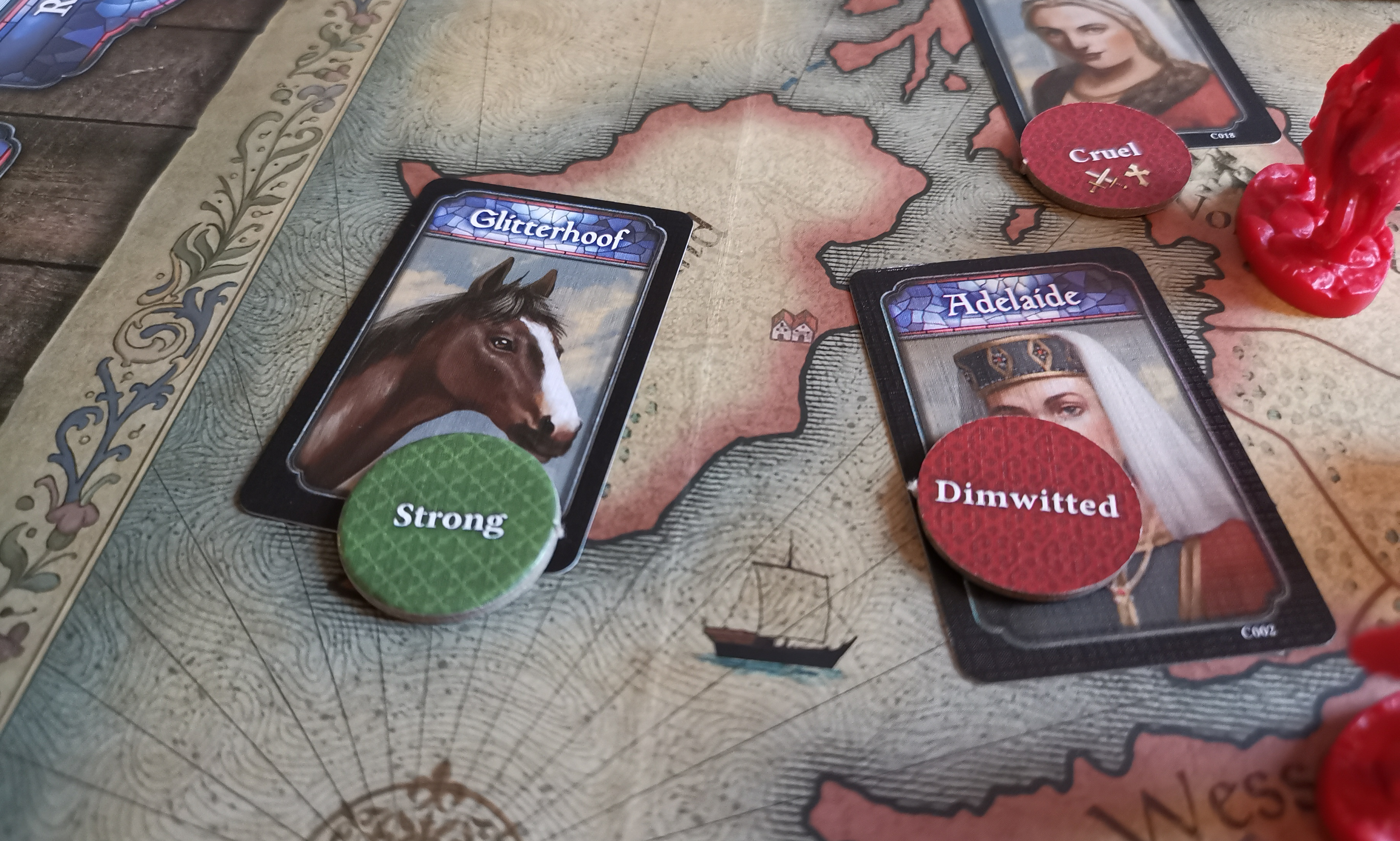
What is it? A tabletop strategy game with warring dynasties and horse marriage.
Expect to pay: £59.10 / $74.50
Developer: Free League
Publisher: Free League
Reviewed on: My table
Players: Three to five, or one to two with AI rules.
Link: Official Site
I was cursed with a terrible family. I was married to a cruel woman and my progeny was a cavalcade of bastards, weaklings and dimwits. The best they could hope for was marrying well, like Robert, who shacked up with a strong and noble horse named Glitterhoof. If I had to pick, I guess he was the best son. In the Crusader Kings board game, children are the future, and England's future was looking very bleak.
Like its PC forebear, Crusader Kings puts you in charge of a medieval dynasty, strictly European for now, which you'll need to nurture while you compete with other dynasties, plotting and fighting to secure your place in history. Maybe you'll go crusading, but equally you might forget all about the Holy Land entirely and just get disgustingly wealthy.
Free League has found a lot of ways to incorporate familiar Crusader Kings 2 elements into the board game, drawing directly from its PC inspiration's pool of traits, events and actions. This is a competitive strategy game that's meant to be completed in a couple of hours, however, so the systems all work differently, but the concepts and spirit of Paradox's grand strategy game persist.
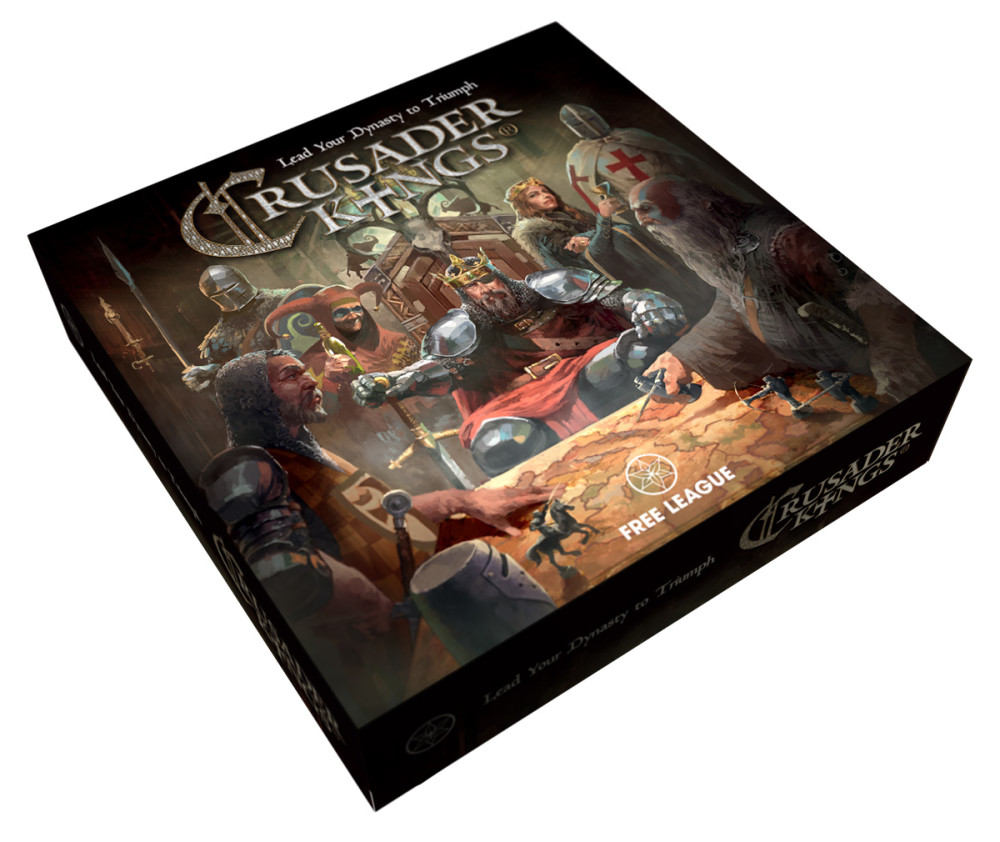
Whenever I wanted to get richer, go to the Holy Land, build a castle or even get married, my rubbish family kept dragging me down. Just like CK2, characters have traits, positive and negative, and a family with a lot of bad qualities is going to have a tougher time getting things done. Here, however, they take the form of red or green tokens that get placed in a bag where they can be drawn to resolve various actions. Dipping your hand into the bag and retrieving a negative trait means you fail the check and don't perform the action.
It's CK2's elaborate character system boiled down to the bare essentials. Treating characters more like strategic resources feels like appropriate abstraction for the competitive nature of the board game, but I do miss the roleplaying touches. The pious trait, for instance, is still going to mean your assassination mission is a success, even though piety and murder aren't good bedfellows. Critical traits are the exception. Every action has one positive and one negative trait associated with it where the rules are reversed. If you want to get married and you pick the positive chaste trait, for instance, that's a failure. If you pluck lusty out of the bag, however, you get hitched.
My kids had none of the good traits. Children don't get added to the pool until the previous generation pops its clogs, at which point the heir becomes the monarch and the other children are upgraded to 'siblings'. That's when their traits get tossed in the bag, for good or ill. In my case, ill. There's time for them to develop some better habits through events, like getting educated by a priest, but sadly my feckless offspring just got more negative ones.
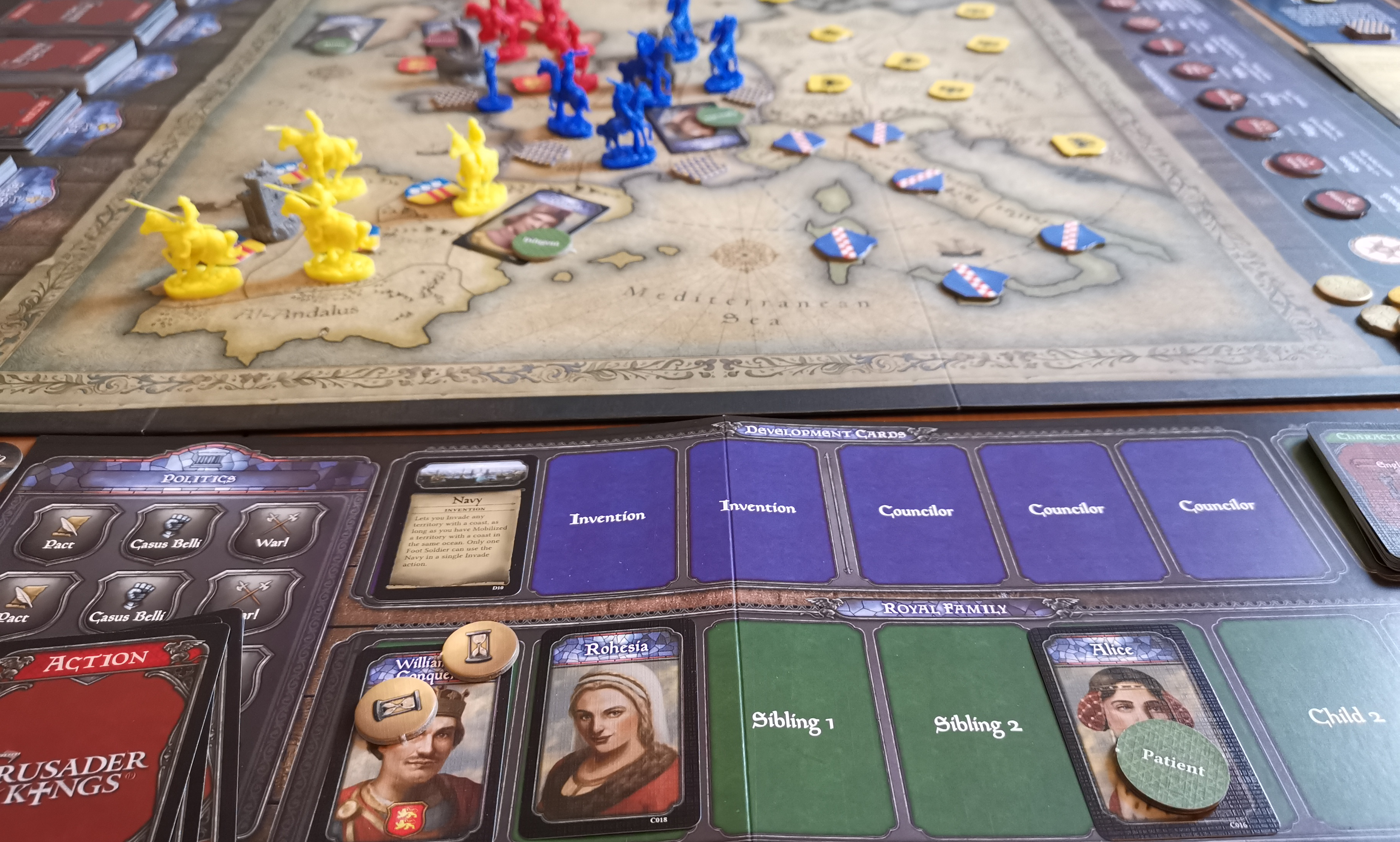
Events are played alongside actions. A tax card could have an event where the next player has a new baby, while an assassination card might also summon a plague. The events are always completely disconnected to the actions and capture some of CK2's randomness, but they can be played tactically and weaponised, too. Sometimes they'll harm you or help your opponent, allowing you to become the architect of your own destruction. It's a bit counter-intuitive, but when there's disease and unrest and spouses dying, it's a pretty convincing illusion of dynamism. Unfortunately, it's equally possible to go a whole turn without a single event doing anything because none of the players meet the requirements.
The biggest gaming news, reviews and hardware deals
Keep up to date with the most important stories and the best deals, as picked by the PC Gamer team.
Too many cards make you have another kid, despite players being limited to only three. It's how I ended up with my rotten sons so quickly. CK2's random events are supported by code that makes sure that certain things are true before they appear, but the cards in the board game are still played regardless of whether or not the event can be resolved. It passes onto the next player until someone resolves the effect or there's nobody left, ending on an anti-climax.
Even if you find yourself with a crap hand and lots of negative traits, there are still opportunities and moves to be made. Some actions skip the trait check, others require cash instead. You can always bargain with other players, too. Almost everything is up for grabs. Trade family members through weddings, cement alliances by trading your navy, swap a spy for a chancellor—the limitations are few. There's a freewheeling spirit to trade and diplomacy, and the rules leave most of it up to the players, but a lot of the intrigue is still supported by the mechanics.
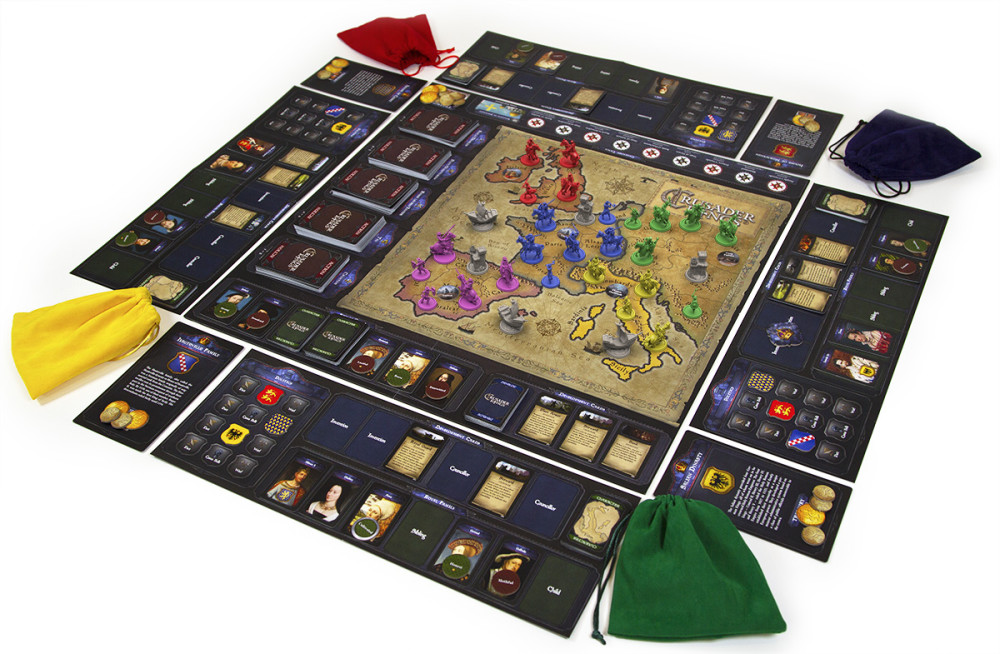
Crusades! It's in the name, so it's got to be important. Except that's not the case in the PC game—unless you want it to be—and it's not really the case with the board game, either. Sure, going off on some holy quest is something you can do, but honestly it's just a lot of hassle. A family member can join the Crusade when you play the appropriate card and pass a trait check, but here the consequences of failing are fatal. The stakes are pretty high, then. A success means you put that character on the Crusades track, bumping it up a slot whenever you play another card. Get to the end and you get another victory point.
The problem is that it takes forever, costs you loads of actions and any reward you get usually comes laden with a negative trait, simulating the bad habits your family members pick up on their holiday. I've yet to see anyone reach Jerusalem, and the only thing encouraging me to take the risk is denying other players the victory point. If they're not going for it, then I'm not interested. I did try to use it to kill off one of my shitty sons, but I ended up pulling one of my few green traits out of the bag. The bastard survived, which of course meant he was rewarded with yet another bad trait.
It's not a great system, but I do appreciate that it's a strategy rather than a necessity. Crusader Kings doles out victory points for a variety of achievements, and while that does encourage you do engage with every part of it, focusing on specific achievements makes just as much sense. You can get a point for building lots of castles, playing development cards (netting you stuff like navies and handy inventions), crusading and conquering. It's a race, though, so you'll need to be the first to build three castles, for instance, if you want the point.
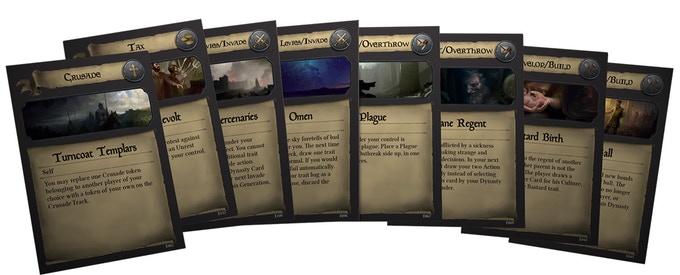
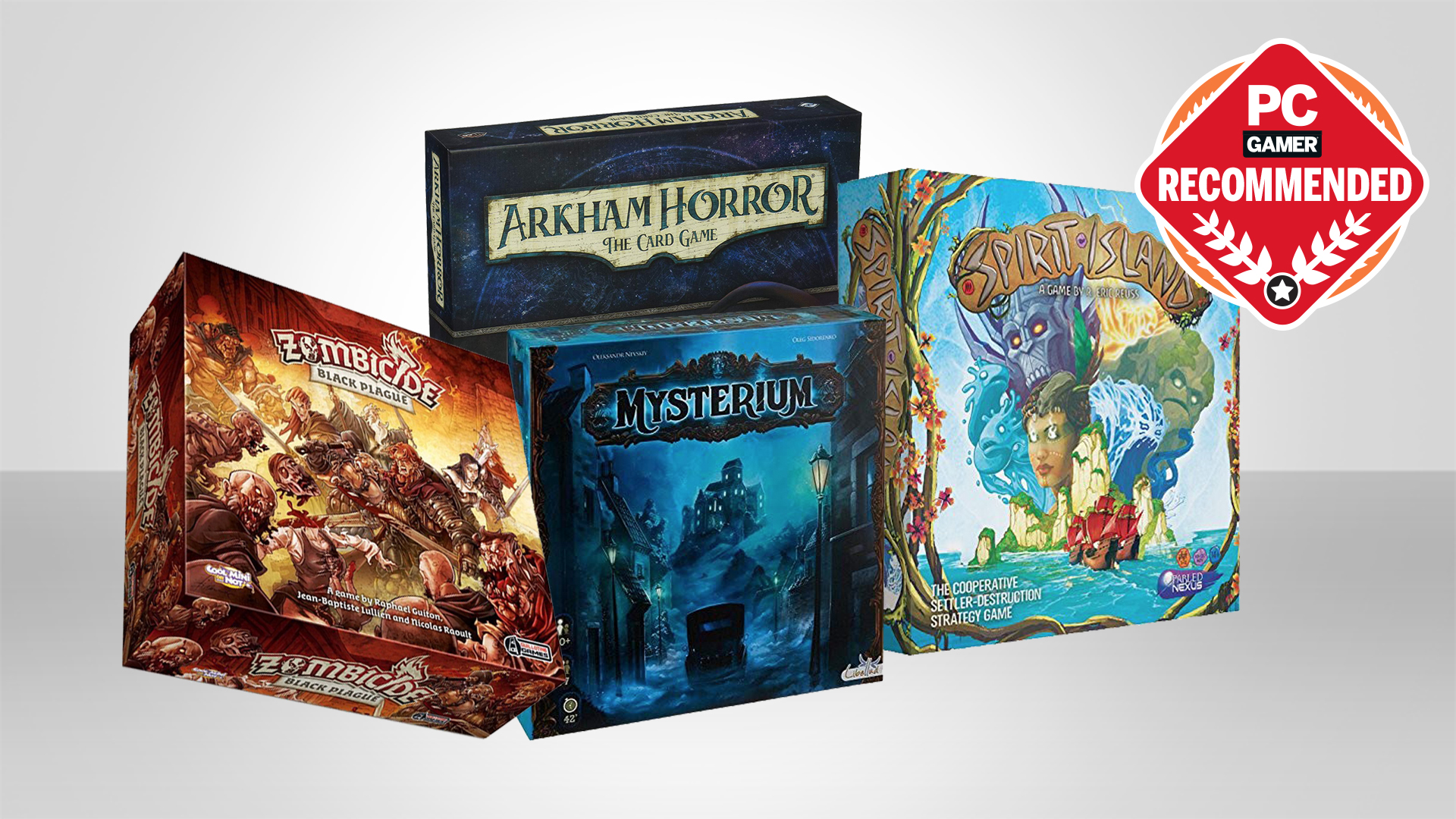
The best board games
Best cooperative board games
The best ways to play board games on PC
The 5 best solo board games
While Crusader Kings can be played with 3-5 players, having only a trio of squabbling dynasties feels like too few. Team-ups always mean one person gets ganged up on, nearly half the map gets ignored—the playable map is determined by how many players there are and what dynasties they've picked—and it inspires direct competition more than plots and alliances. In a full game, you're more likely to have multiple rivals and allies, leading to a more lively, boisterous game.
There is the option to play solo or with one other player, filling in the other spaces with AI dynasties. There are special rules and AI strategies in the manual, and while playing without the social aspect isn't very appealing, it's still a welcome accessibility feature.
Crusader Kings is a valiant attempt to adapt the dynastic soap opera for tabletops, and while I'm not sold on all of its mechanics, the potential for fun player drama makes up for a lot of deficiencies.The most important feature, equine marriage, persists, and what more can you ask for? I expect I'll bring it out again if I can fill all the spots, but the whole time I'll be trying to convince everyone to play some CK2 multiplayer instead.

Fraser is the UK online editor and has actually met The Internet in person. With over a decade of experience, he's been around the block a few times, serving as a freelancer, news editor and prolific reviewer. Strategy games have been a 30-year-long obsession, from tiny RTSs to sprawling political sims, and he never turns down the chance to rave about Total War or Crusader Kings. He's also been known to set up shop in the latest MMO and likes to wind down with an endlessly deep, systemic RPG. These days, when he's not editing, he can usually be found writing features that are 1,000 words too long or talking about his dog.

